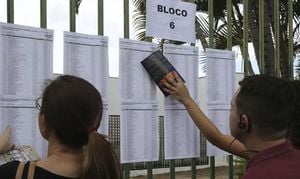Szymon Hołownia, a prominent Polish politician and leader of the political party Poland 2050, has recently found himself at the center of controversy following a photo of him using his phone at the funeral of Pope Francis. The image, which circulated widely on social media, sparked a wave of criticism from various political figures and commentators.
Daniel Obajtek, a member of the ruling Law and Justice party (PiS), commented on the incident, stating, "The man has stopped performing for television, but his habits remain." This remark highlights the perception that Hołownia’s actions were more about self-promotion than respect for the solemn occasion. Meanwhile, Tomasz Trela, a representative from the Left party, urged Hołownia to exhibit more seriousness in such a grave setting.
In defense of his actions, Hołownia explained that he was documenting the event to capture significant moments for many attendees, particularly for Poles who held the occasion in high regard. He stated, "We pray, we experience, we document, and we will remember forever." His intention was to preserve the memory of the event, which many viewed as a historical moment.
The controversy continued to unfold during a presidential debate held on April 28, 2025, by the newspaper Super Express. Thirteen candidates participated in this debate, where they posed questions to one another. Sławomir Mentzen, leader of the Confederation party, took the opportunity to reference the phone incident while engaging with Hołownia.
Mentzen approached Hołownia's table and took out his phone, inviting Hołownia to join him for a selfie. This action was perceived as a direct jab at Hołownia, mocking his earlier behavior at the Pope's funeral. Hołownia, maintaining his composure, smiled and posed for the photo before proceeding to ask Mentzen a prepared question regarding his claim that he was the only candidate capable of defeating Rafał Trzaskowski in a potential second round of voting.
During the debate, Mentzen shared the selfie on social media, captioning it with a pointed remark: "Taking selfies is one of the few things Szymon Hołownia has experience in." This comment further fueled the narrative surrounding Hołownia’s perceived lack of seriousness in political matters.
While the debate showcased the candidates' interactions, it also highlighted the ongoing discourse about decorum and respect in political settings. The incident at the funeral and its aftermath have raised questions about the appropriateness of such behaviors among public figures.
In addition to Hołownia and Mentzen, other candidates such as Rafał Trzaskowski, Karol Nawrocki, Magdalena Biejat, and Adrian Zandberg were also present at the debate, which was characterized by a format that encouraged direct questioning among the candidates.
The backlash against Hołownia's actions was not limited to political commentary. Aleksandra Pakuła, an expert on savoir-vivre, expressed her dismay at the behavior of politicians who took selfies during the Pope's funeral. She remarked, "As a society, we have become idiotic. When I saw those photos from the funeral, I completely lost hope." Pakuła emphasized that such behavior reflects poorly on both the politicians and society at large, suggesting that the act of taking selfies at a solemn event undermines its significance.
Pakuła continued, "This is the flower of Polish intelligence. These are our representatives. These people, during the funeral of the head of the Catholic Church, are taking selfies. That says a lot about them, but also about us." Her comments resonated with many who felt that the actions of public figures should reflect a higher standard, especially during moments of national mourning.
The debate and the surrounding incidents have ignited discussions about the role of social media in politics and the expectations placed on public figures. As candidates vie for votes in the upcoming presidential elections, their actions—both on and off the stage—are under scrutiny like never before.
In the wake of these events, Hołownia's approach to public appearances and his communication strategy may face reevaluation. The criticism he has received could influence how he engages with the public and other political figures in the future. As the political landscape in Poland evolves, the expectations for decorum and respect during significant events will likely remain a topic of discussion.
Ultimately, this incident serves as a reminder of the delicate balance politicians must strike between personal expression and public expectation. As the presidential election approaches, candidates will need to navigate these waters carefully, ensuring that their actions resonate positively with the electorate.




